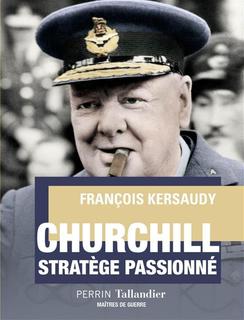
Finest Hour 176
Books, Arts & Curiosities – Maître de Guerre

July 15, 2017
Finest Hour 176, Spring 2017
Page 49
Review by Antoine Capet
François Kersaudy, Churchill: Stratège passionné, Paris: Perrin/Tallandier, 2016, 447 pages, €24. ISBN: 978-2262050474.
Many Finest Hour readers will no doubt be familiar with François Kersaudy’s 1981 monograph Churchill and de Gaulle. As the most eminent Churchill scholar in France, Kersaudy has also widely published on the great man in French magazines, and his biography of Churchill in French (revised & enlarged in 2009) is unanimously regarded as the best in the language.
Professor Kersaudy did his thesis on the Norway Campaign of 1940 and has kept a life-long interest in Second World War studies— so much so that, in a way, he is himself the “passionate strategist,” which he sees in Churchill. Nobody is better qualified, therefore, to write the volume on Churchill as “Maître de Guerre”(master of war) in the series of the same name, which Kersaudy also co-edits.
Kersaudy does not quote Churchill’s reflection on the night of 10 May 1940, as given in the last paragraph of The Gathering Storm (“I felt…that all my past life had been but a preparation for this hour and for this trial”), but his chapters on 1940 to 1945 are entirely impregnated with this underlying idea, especially Chapter 8, concerning June to October 1940 and predictably titled “La plus belle heure” (the finest hour). Now the “strategist” was able to give full vent to his inspiration and intuitions.
“But this unequalled organiser, inventor, propagandist and tactician,” Kersaudy warns the reader, “doubles up as a disquieting strategist: confusing the desirable with the possible, neglecting logistics, immersing himself in details at the expense of the whole picture, this conductor of genius is constantly tempted to leave his rostrum to play the scores of the violinist or trumpeter. If most false notes were in fact avoided, it is only because this flamboyant maestro was surrounded by professionals who, if notably less inspired, were far more reflective.” Churchill’s team saved him from many errors.

2024 International Churchill Conference
Among these “far more reflective” strategists in Churchill’s entourage, General (later Field Marshal) Alan Brooke probably plays the most visible role in Kersaudy’s narrative—as he should. But of course, from 1941 Churchill was no longer alone as warlord: he had to share the planning of future operations with two other giants who came to dwarf him.
Chapter 11, entitled “A subordinate victor,” harps on the same theme, with Churchill powerless to check Soviet expansionism in the face of President Roosevelt’s benevolent attitude to Stalin’s scheming. The “strategist” has no more opportunities to see a concrete translation of his bright ideas as these are ruthlessly vetoed by the Americans. Likewise, in Chapter 12, “Renaissance,” the recognition of Churchill’s geo-strategic vision gets off to a slow start. Kersaudy reminds us that “on both sides of the Atlantic, the Fulton speech was misunderstood by the population, denounced by the press and disowned….” But then of course Churchill was fundamentally right in his judgement, as it turned out.
Kersaudy argues that when Churchill returned to Downing Street in 1951 he wanted to take up the summitry as it had been left at Potsdam in 1945, entertaining the chimera that with him instead of Attlee, Britain would again successfully play the role of honest broker between the two thermonuclear superpowers. Kersaudy makes much of Churchill’s brilliant Commons speech of 1 March 1955 in which he publicly announced that Britain was joining the H-bomb race with a view to assuring a lasting peace by deterrence and the balance of terror. We now know that the British deterrent was only a drop in the ocean of Soviet-American weaponry and that only seven years later Macmillan made it almost entirely dependent on American goodwill, thereby putting a definitive end to Churchill’s last strategic ambition.
What remained, then, of Churchill’s life-long and “passionate” struggle to preserve peace, freedom, and the world status of his country—all three simultaneously if possible? Kersaudy aptly points out that in the later stages of the war, when it was clear beyond doubt that Hitler was going to be defeated, Churchill feared a replacement of the brown plague by a red one. He also rightly quotes Churchill’s prediction to his private secretary “Jock” Colville that Colville would see the crumbling of the Soviet bloc in his lifetime. In fact Colville missed it by two years—but the fundamental conclusion that Soviet Communism could not endure was of course vindicated, some twenty-five years after Churchill’s own death. Yet, if Churchill’s “strategy” can be credited with having effectively brought down Naziism, it seems impossible to argue seriously that it in any way contributed to the melting-down of Soviet communism.
The volume can only be hailed as a tour-de-force—not because it produces new facts, but because of Kersaudy’s mastery in adducing and manipulating such a mass of sources, and arranging them into a coherent synthesis both eminently readable and perfectly convincing. Kersaudy’s vivid prose is a delight, and the proof-checking was faultless. Unreservedly recommended.
Antoine Capet is the former Head of British Studies at the University of Rouen.
Subscribe
WANT MORE?
Get the Churchill Bulletin delivered to your inbox once a month.


